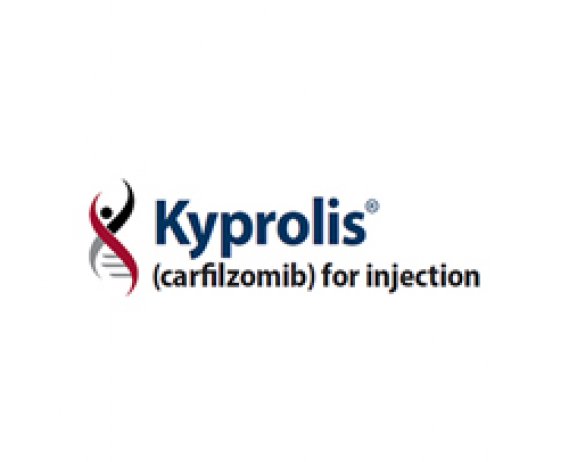Kyprolis® (carfilzomib) for injection is a proteasome inhibitor used to treat patients with relapsed or refractory multiple myeloma.
What Are the Indications for Treatment with Kyprolis?
- Kyprolis is currently approved by the US Food and Drug Administration (FDA) in the following settings:
- Kyprolis, Darzalex® (daratumumab) and the steroid dexamethasone is used for the treatment of patients with relapsed or refractory myeloma who have received one or more prior lines of therapy.
- Kyprolis, Revlimid® (lenalidomide) and dexamethasone (KRd) is used for the treatment of patients with relapsed or refractory myeloma who have received one to three prior lines of therapy.
- Kyprolis and dexamethasone (Kd) is used for the treatment of patients with relapsed or refractory myeloma who have received one to three prior lines of therapy.
- Kyprolis is used as a single agent (alone) for the treatment of patients with relapsed or refractory multiple myeloma who have received one or more lines of therapy.
How Does It Work?
Kyprolis forms an irreversible bond with the proteasome in the nucleus of each myeloma cell. Proteasome inhibitors block a cell's proteasomes causing proteins to build up inside the cell, resulting in cell death.
How Is Kyprolis Given?
Kyprolis is a freeze-dried powder, which must be reconstituted (dissolved) before it is administered. Kyprolis is administered intravenously (into the vein - IV) at a doctor’s office, hospital, or clinic. Hydration may be given before and after each dose of Kyprolis, based upon the patient’s tolerance of Kyprolis, the dose of Kyprolis, and the duration of infusion time.
What Are the Dose and Schedule of Kyprolis?
There are different dosing regimens for Kyprolis. Hydrate prior to and following Kyprolis as needed. Pre-medicate prior to all Cycle 1 doses and if infusion-related reactions develop or reappear. You and your doctor will determine which one of the following dosing regimens is best for you:
Once-weekly Kd regimen
- Kyprolis is given at 20 mg/m2 for the first dose (Cycle 1, day 1), then 70mg/m2 is given once weekly on days 8 and 15.
- From Cycle 2 onward, Kyprolis is given at 70 mg/m2 on days 1, 8, and 15 of each 28-day Cycle.
- No Kyprolis is given on days 16–28 of any Cycle.
- Dexamethasone is given at a dose of 40 mg on days 1, 8, 15, and 22. of Cycles 1–9.
- Thereafter, dexamethasone is given only on days 1, 8, and 15 of each 28-day Cycle.
Twice-weekly Kd regimen or Kyprolis monotherapy
20/56 mg/m2 by 30-minute infusion
- Kyprolis is given at 20 mg/m2 on days 1 and 2 of Cycle 1.
- Then, if tolerated, the Kyprolis dose is escalated to 56 mg/m2 on days 8, 9, 15, and 16.
- From Cycle 2–12, Kyprolis is given at 56 mg/m2 On days 1, 2, 8, 9, 15, and 16 of each 28-day Cycle.
- From Cycle 13 onward, Kyprolis is given at 56 mg/m2 on days 1, 2, 15, and 16 of each 28-day Cycle.
- No Kyprolis is given on days 17–28 of any Cycle.
- Dexamethasone is not given with Kyprolis monotherapy.
- If you are on the Kd regimen, dexamethasone is given at 20 mg per day on days 1, 2, 8, 9, 15, 16, 22, and 23 of each 28-day Cycle.
Twice-weekly Kyprolis monotherapy
20/27 mg/m2 by 10-minute infusion
- Kyprolis is given at a dose of 20 mg/m2 on Cycle 1, days 1 and 2.
- If tolerated, the dose is escalated to 27 mg/m2 on days 8, 9, 15, and 16 of the first Cycle.
- In Cycles 2–12, Kyprolis is given at 27 mg/m2on days 1, 2, 8, 9, 15, and 16 of each 28-day Cycle.
- From Cycle 13 onward, Kyprolis is given at 27 mg/m2 on days 1, 2, 15, and 16 of each 28-day Cycle.
- No Kyprolis is given on days 17–28 of any Cycle.
Twice-weekly KRd regimen
20/27 mg/m2 by 10-minute infusion:
- Kyprolis is given during Cycle 1 at 20 mg/m2 on days 1 and 2and if tolerated, at 27 mg/m2 on days 8, 9, 15, 16.
- In Cycles 2–12, Kyprolis is given at 27 mg/m2 days 1, 2, 8, 9, 15, and 16 of each 28-day Cycle.
- From Cycle 13 onward, Kyprolis is given at 27 mg/m2 on days 1, 2, 15, 16 of each 28-day Cycle.
- No Kyprolis is given on days 17–28 of any Cycle.
- Revlimid is given at 25 mg on days 1–21 of each 28-day Cycle.
- Dexamethasone is given at 40 mg on days 1, 8, 15, and 22 of each 28-day Cycle.
Twice-weekly DKd regimen
20/56 mg/m2 by 30-minute infusion
- Kyprolis is given on days 1, 2, 8, 9, 15, and 16 of each 28-day treatment Cycle.
- For Cycle 1 only, patients receive a 20-mg/m2 loading dose of Kyprolis on days 1 and 2.
- For all subsequent treatments thereafter, Kyprolis is administered at a dose of 56 mg/m2 .
- Darzalex is given at a dose of 16 mg/kg on days 1, 8, 15, and 22, of Cycles 1 and 2.*
- It is then given every 2 weeks during Cycles 3 to 6.
- Then Darzalex is given every 4 weeks during Cycle 7 and beyond.
- *Note: For patient convenience, the initial dose of Darzalex is split into two 8-mg/kg doses and given on Cycle 1, day 1 and Cycle 2, day 2.
- Dexamethasone is given at a dose of 40 mg on days 1, 8, 15, and 22 of each treatment Cycle.
- During weeks when patients receive Kyprolis** and/or Darzalex, a split dose of 20 mg each of dexamethasone was given.
**Note: The dose of Kyprolis must be reduced by 25% in patients with mild or moderate liver disease.
Treatment with Kyprolis may be continued until disease progression or unacceptable toxicity. Your doctor will evaluate your disease, your response to Kyprolis, and your tolerance of your medications to determine how many cycles of treatment are right for you, and will make any dose or schedule adjustments as necessary. It may be necessary to reduce the dose of Kyprolis or stop treatment temporarily until a side effect improves, and then resume again.
Caution should be exercised with higher doses of Kyprolis. A member of your healthcare team should monitor you carefully for infusion reactions when the Kyprolis is administered. It is very important that you promptly report to your healthcare team any side effects that you experience in the days after your infusion.
Important Safety Information
- Kyprolis can cause heart problems or worsen pre-existing heart conditions. Death due to cardiac arrest has occurred within one day of Kyprolis administration. Before starting Kyprolis, you should have a full medical workup (including blood pressure and fluid management). You should be closely monitored during treatment.
- You will be pretreated with dexamethasone prior to all cycle 1 doses and if infusion reaction symptoms appear.
- You should drink water at a rate of 30 milliliters (1 ounce) for every kilogram (2.2 pounds) of your body weight at least 48 hours before your first infusion.
- You will receive medication to prevent blood clots if you are taking Kyprolis in combination with dexamethasone or with Revlimid + dexamethasone (Rd) or with daratumab + dexamethasone.
- You should receive antiviral therapy to decrease the risk of shingles, a reactivation of the herpes zoster virus.
- If you are receiving hemodialysis for kidney failure, you should receive Kyprolis after the hemodialysis procedure.
- Females of reproductive potential should avoid becoming pregnant during treatment with Kyprolis, and should not take Kyprolis while breastfeeding.
Warnings and Precautions
Kyprolis (carfilzomib) can cause serious side effects:
Kidney problems: There have been reports of sudden kidney failure in patients receiving Kyprolis. Your kidney function should be closely monitored during treatment.
Tumor lysis syndrome (TLS): Cases of TLS have been reported in patients receiving Kyprolis, including fatalities. You should be closely monitored during treatment for any signs of TLS.
Lung damage: Cases of lung damage have been reported in patients receiving Kyprolis, including fatal cases.
Pulmonary hypertension (high blood pressure in the lungs): There have been reports of pulmonary hypertension in patients receiving Kyprolis.
Lung complications: Shortness of breath was reported in patients receiving Kyprolis. Your lung function should be closely monitored during treatment.
High blood pressure: Cases of high blood pressure, including fatal cases, have been reported in patients receiving Kyprolis. Your blood pressure should be closely monitored during treatment.
Blood clots: There have been reports of blood clots in patients receiving Kyprolis. If you are at high risk for blood clots, your doctor can recommend ways to lower the risk.
If you are using birth control pills or other medical forms of birth control associated with a risk of blood clots, talk to your doctor and consider a different method of birth control during treatment with Kyprolis in combination with dexamethasone, with lenalidomide plus dexamethasone, or with daratumumab and dexamethasone.
Infusion-related reactions: Signs and symptoms of infusion-related reactions included fever, chills, joint pain, muscle pain, facial flushing and/or swelling, swelling of the larynx (voice box), vomiting, weakness, shortness of breath, low blood pressure, fainting, chest tightness, and chest pain. These symptoms can occur immediately following infusion or up to 24 hours after administration of Kyprolis. If you experience any of these symptoms, contact your doctor immediately.
Severe bleeding problems: Fatal or serious cases of bleeding problems have been reported in patients receiving Kyprolis. Your doctor should monitor your signs and symptoms of blood loss.
Very low platelet count: Low platelet levels can cause unusual bruising and bleeding. You should have regular blood tests to check your platelet count during treatment.
Liver problems: Cases of liver failure, including fatal cases, have been reported in patients receiving Kyprolis. Your liver function should be closely monitored during treatment.
Blood problems: Cases of a blood disease called thrombotic microangiopathy, including thrombotic thrombocytopenic purpura/hemolytic uremic syndrome (TTP/HUS), including fatal cases, have been reported in patients who received Kyprolis. Your doctor should monitor your signs and symptoms.
Brain problems: A nerve disease called Posterior Reversible Encephalopathy Syndrome (PRES), formerly called Reversible Posterior Leukoencephalopathy Syndrome (RPLS), has been reported in patients receiving Kyprolis. It can cause seizure, headache, lack of energy, confusion, blindness, altered consciousness, and other visual and nerve disturbances, along with high blood pressure. Your doctor should monitor your signs and symptoms.
Cases of a brain infection called Progressive Multifocal Leukoencephalopathy (PML), including fatal cases, have been reported in patients receiving Kyprolis. Your doctor should monitor your signs and symptoms.
Kyprolis should not be combined with melphalan and prednisone: Newly diagnosed transplant ineligible multiple myeloma patients have shown an increased risk of serious and fatal side effects when using Kyprolis in combination with melphalan and prednisone.
Possible side effects
The most common side effects happened in at least one out of five patients receiving Kyprolis:
- Low red blood cell count
- Diarrhea
- Tiredness (fatigue)
- High blood pressure
- Fever
- Upper airway (respiratory tract) infection
- Low platelets
- Cough
- Difficulty breathing
- Sleeplessness (insomnia)
Kyprolis in Clinical Trials
Kyprolis is being studied throughout the myeloma disease course in numerous clinical trials. In December 2023, the results from the IsKia phase III clinical trial were presented at a plenary session of the annual meeting of the American Society of Hematology (ASH). The study evaluated 302 patients with newly diagnosed multiple myeloma (NDMM) who were eligible for an autologous stem cell transplant (ASCT). Patients were randomized to two study arms with 151 patients in each arm.
One arm received Kyprolis, Revlimid, and dexamethasone [KRd]. The other arm received Sarclisa® (isatuximab-irfc) plus KRd [Isa-KRd]. This clinical trial assessed efficacy and safety of Isa-KRd as pre-ASCT induction therapy and post-ASCT consolidation therapy.
Compared to KRd alone, Isa-KRd induction and consolidation significantly increased the rates of MRD-negativity in every treatment phase and with no new safety concerns, including in patients with high-risk multiple myeloma (HRMM).
To learn about clinical trials that may be enrolling myeloma patients, please visit the National Cancer Institute website clinicaltrials.gov or contact the IMF InfoLine.
Additional information
Official drug manufacturer's website for Kyprolis (carfilzomib)
Kyprolis Patient Support Program
The International Myeloma Foundation medical and editorial content team
Comprised of leading medical researchers, hematologists, oncologists, oncology-certified nurses, medical editors, and medical journalists, our team has extensive knowledge of the multiple myeloma treatment and care landscape. Additionally, Dr. Brian G.M. Durie reviews and approves all medical content on this website.
Last Medical Content Review: September 13, 2021








